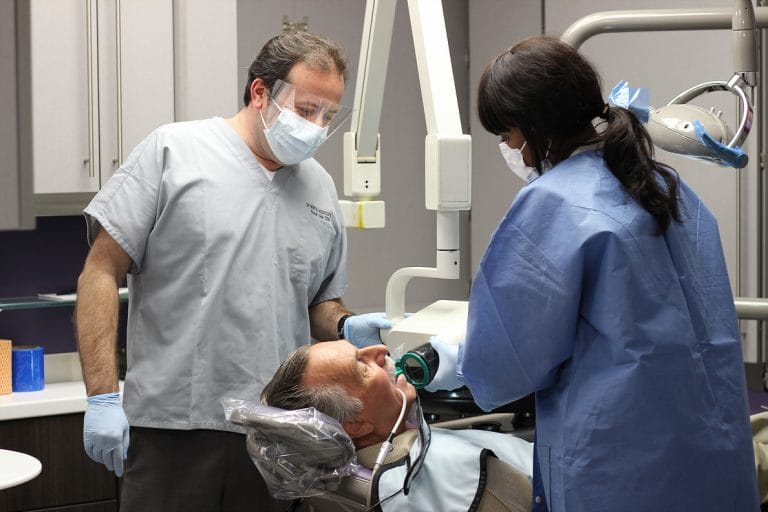A cavity is a decaying portion of a tooth. It commonly occurs when acids damage the outer enamel that protects your teeth from corrosion. Cavities form when there is no more protective enamel to guard the inner-layers of your tooth.
Signs and Symptoms
There are three main symptoms that your dentist may associate with a possible cavity diagnosis. These aren’t the only symptoms of tooth decay, but they are good reasons for you to contact our dental team for treatment as soon as possible.
- Toothaches: Toothaches are typically a throbbing pain within your tooth that is not a result of an injury. It may also be accompanied by a swelling of the gums around the tooth.
- Increased Sensitivity: Cavities often cause your teeth to become more sensitive to otherwise normal conditions. It could include sensitivities to temperature. You may also experience discomfort when eating sugary foods.
- Pain When Chewing: If you experience any pain when chewing foods, then you should schedule an examination with your dentist right away. It is one of the major red-flags of an existing cavity.
What Causes Cavities?
The main underlying cause of dental cavities is the bacteria that naturally forms around teeth. It’s also known as plaque. This bacteria creates acids from breaking the foods we eat. These acids are also formed when drinking sugary drinks.
The acid created by plaque can remove vital minerals from enamel. It weakens the enamel overtime causing a cavity to form. When acids breach through your enamels, then they can continue to decay the underlying dentin in your tooth.
A cavity can eventually make it’s way to nerve endings. That is the point when most people first notice that they have a very serious dental problem. Not all cavities are visible to the naked eye. Your dentist will perform a physical examination of your tooth, and a dental x-ray of the dentin will reveal any issues that can’t be diagnosed through examination.
If your tooth isn’t treated, then the decay will continue to cause significant damages. There is a risk of infection associated with tooth decay when it reaches the nerve endings. An abscess may form within your gums.
Infections are much harder to treat, and they may require dental surgery. It is important to treat a cavity as a means of prevention from more serious complications that can occur.
How Can You Prevent Cavities?
According to the American Dental Association, the best prevention method for cavities is good oral hygiene. You should brush your teeth at least twice daily to prevent excessive bacteria build up. Brushing helps remove plaque from the surface of your teeth, and it helps reduce the amount of bacteria below your gum line.
Flossing is very important for cavity prevention as well. Brushing alone may not remove hard to reach plaque in between your teeth. You should also schedule regular checkups with your dentist routinely throughout the year.
Always use fluoride toothpastes when brushing your teeth. Fluoride is an antiseptic agent that kills most bacteria in your mouth on contact. Your child’s pediatrician can also prescribe fluoride supplements to reduce the risks of your children developing a cavity.
Your diet plays a big role in oral hygiene. Foods that are rich in starches may increase your chances of enamel loss. Try to avoid eating sugary snacks between meals to cut back on the amount of exposure to acids.
Having a dry mouth as a result of other complications will significantly increase your risks of tooth decay. Remember to stay hydrated by drinking plenty of fluids throughout the day.
Treating Cavities
If your dentist is able to place a diagnosis within the early stages, then fluoride treatment may be able to reverse the decaying process. This is only possible under certain circumstances, but your dentist will be able to judge when further action treatment is needed.
The next step in treatment is a dental filling. The damaged section of your tooth will be filled to prevent plaque buildup inside your tooth. You may need a full crown cap in order to save the underlying tooth, but it depends on how far the decay has spread.
Tooth extraction may be recommended in the most severe cases. If infection has spread to the nerve endings inside your gums, then a root canal procedure may be necessary. Root canals are typically more costly than other options. That’s why it is very important to diagnose tooth decay early on. Make oral hygiene your priority to keep a healthy smile for years to come.
Think you may have a cavity or interested in preventative care? Contact the friendly dental staff at 3V Dental Associates today to schedule your next office visit.




